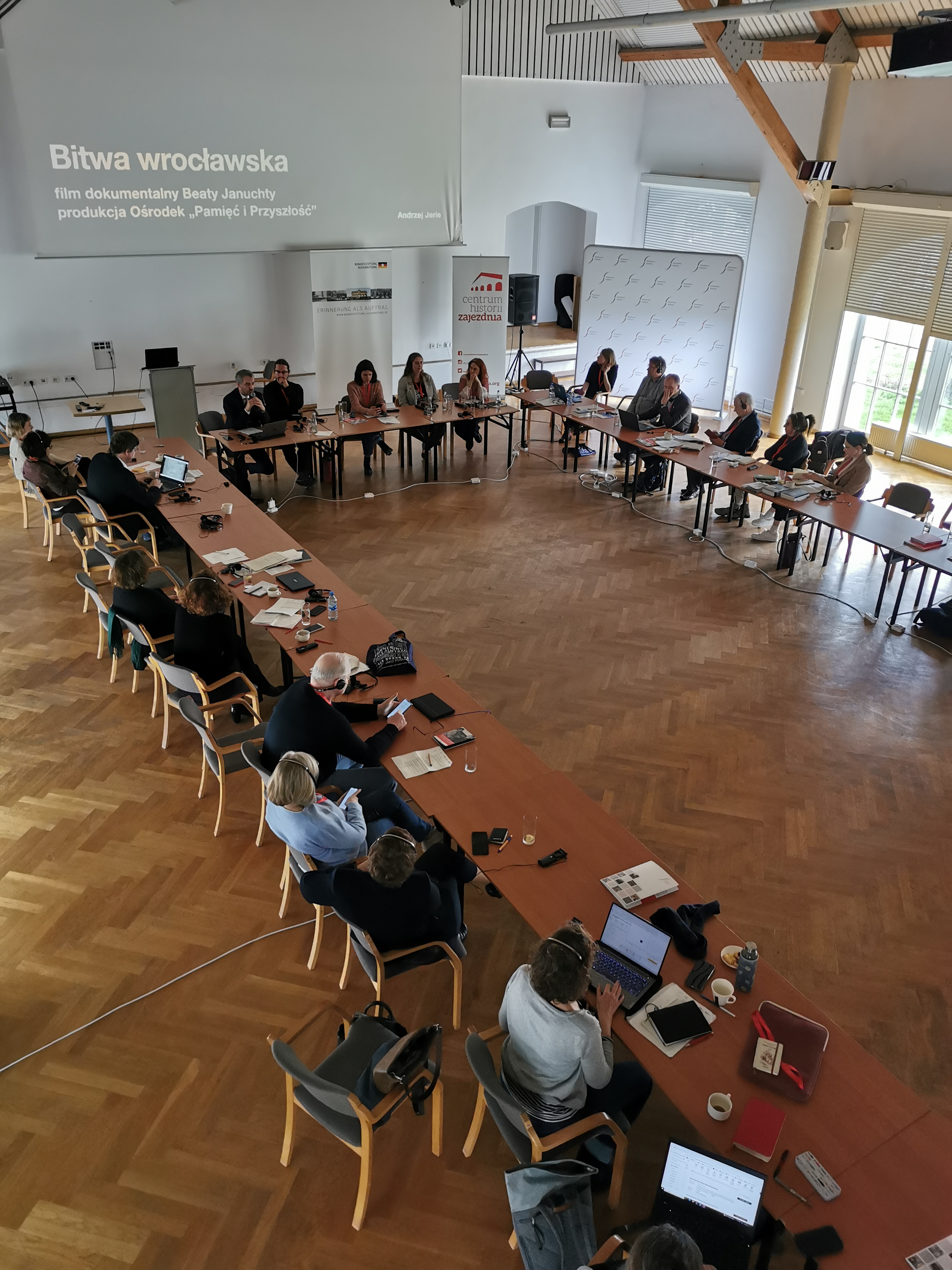
The East-West European Memorial Meeting in Krzyżowa/Kreisau is aimed at employees of memorial sites, museums, memorials, educational centers, human rights organizations or contemporary witness projects. The aim of the memorial meeting is to get to know each other and to exchange knowledge and experience. From 29 March to 1 April 2023, it took place for the 20th time in Kreisau.
You can download a detailed conference report as a pdf on this page.
![]() 20 Memorial Seminar Krzyzowa 2023.pdf
20 Memorial Seminar Krzyzowa 2023.pdf
This year's meeting focused on insurrection, protest and resistance - debates in Eastern and Western Europe in the post-war and post-communist period and the remembrance of these in museums and memorial sites. Among the lecturers were Dr. habil. Magdalena Saryusz-Wolska (German Historical Institute Warsaw), Prof. Dr. Claudia Weber (European University Viadrina, Frankfurt (Oder)), Prof. em. Dr. Peter Steinbach (German Resistance Memorial Centre, Berlin), Dr. Raphael Utz (German Historical Museum, Berlin), Dr. Martyna Gradzka-Rejak (Biuro Badań Historycznych IPN and Muzeum Getta Warszawskiego, Warsaw), Irmgard Zündorf (Leibniz Centre for Contemporary History Research, Potsdam), Nataliia Ivchyk (NGO Mnemonic, Ukraine), Vytautas Jurkus i Vytautas Petrikenas (9th Fort Kaunas, Lithuania) and Dr. Andrea Genest (Ravensbrück Memorial).
"Together with representatives of museums, archives and educational projects, as well as makers of historical and artistic exhibitions from all over Europe, we will discuss in Kreisau about gains in knowledge, controversies, different perspectives on resistance and protest in totalitarian regimes of the 20th century and today, as well as national characteristics and cross-border commonalities in dealing with the past and the present," said one of the organisers of the seminar.
Memory and history of protest cultures of the 20th century are an important part of state self-understanding and self-assurance in Europe. They are always about the renegotiation of democratic participation, freedom and human dignity. They are the subject of educational work and the topic of exhibitions at memorials and places of remembrance. It becomes clear that the way we remember resistance, protest and uprisings differs significantly from country to country. Therefore, we focus on the question: When do representations of protest and uprisings in state museums and memorial sites in Europe change? What common features and differences can we identify? It is obvious that not all forms of protest find their way into the official canon. Some protests are hushed up, forgotten, while others take on symbolic significance beyond national borders. What function do remembrance and commemoration of protests and resistance perform for the respective society?
Resistance to the Nazi regime was wide-ranging. It took many forms, from passive resistance, sabotage, the documentation of crimes to emigration and the planned/attempted coup d'état of July 20, 1944. The resistance was supported by men and women from all social classes and political camps. Opposition circles in the Wehrmacht, in the occupied territories were just as much a part of it as, for example, the members of the "Kreisau Circle".
After the communists came to power and socialist dictatorships were established in Eastern Europe, resistance remained the order of the day, but the forms of protest changed significantly. Strikes, student protests and popular uprisings such as June 17, 1953 in the GDR, October 1956 in Hungary, or Prague 1968 and Solidarnosc in Poland continue to shape our culture of remembrance today. In Western Europe, too, protests and uprisings and the memory of those occupy a significant place in the processes of social change. In the 21st century, too, we remain witnesses of uprisings and protests; achievements of democratic participation and rights are again called into question and have to be fought for anew.
The Memorial Seminar has been organised by members of staff of Krzyzowa Foundation for Mutual Understanding in Europe, Federal Foundation for the Reappraisal of the SED Dictatorship (Berlin), Remembrance and Future Centre (Wrocław), Evangelical Academy Berlin and Foundation Remembrance, Responsibility and Future.




